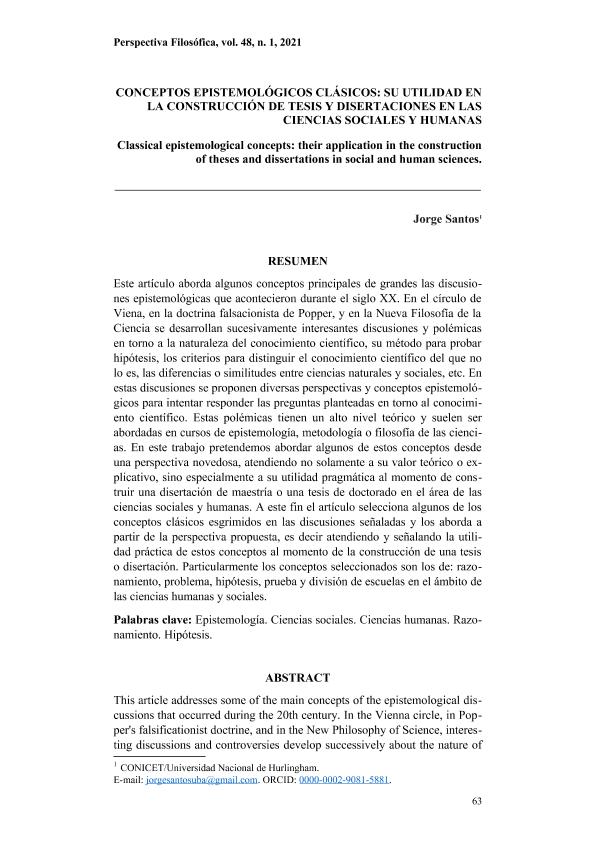Artículo
Este artículo aborda algunos conceptos principales de grandes las discusiones epistemológicas que acontecieron durante el siglo XX. En el círculo de Viena, en la doctrina falsacionista de Popper, y en la Nueva Filosofía de la Ciencia se desarrollan sucesivamente interesantes discusiones y polémicas en torno a la naturaleza del conocimiento científico, su método para probar hipótesis, los criterios para distinguir el conocimiento científico del que no lo es, las diferencias o similitudes entre ciencias naturales y sociales, etc. En estas discusiones se proponen diversas perspectivas y conceptos epistemológicos para intentar responder las preguntas planteadas en torno al conocimiento científico. Estas polémicas tienen un alto nivel teórico y suelen ser abordadas en cursos de epistemología, metodología o filosofía de las ciencias. En este trabajo pretendemos abordar algunos de estos conceptos desde una perspectiva novedosa, atendiendo no solamente a su valor teórico o explicativo, sino especialmente a su utilidad pragmática al momento de construir una disertación de maestría o una tesis de doctorado en el área de las ciencias sociales y humanas. A este fin el artículo selecciona algunos de los conceptos clásicos esgrimidos en las discusiones señaladas y los aborda a partir de la perspectiva propuesta, es decir atendiendo y señalando la utilidad práctica de estos conceptos al momento de la construcción de una tesis o disertación. Particularmente los conceptos seleccionados son los de: razonamiento, problema, hipótesis, prueba y división de escuelas en el ámbito de las ciencias humanas y sociales. This article addresses some of the main concepts of the epistemological discussions that occurred during the 20th century. In the Vienna circle, in Popper's falsificationist doctrine, and in the New Philosophy of Science, interesting discussions and controversies develop successively about the nature of scientific knowledge, its method to test hypotheses, the criteria to distinguish scientific knowledge of which it is not, the differences or similarities between natural and social sciences, etc. In these discussions, various perspectives and epistemological concepts are proposed to try to answer the questions asked about scientific knowledge. These controversies have a high theoretical level and are usually addressed in epistemology, methodology or philosophy of science courses. In this work we intend to approach some of these concepts from a novel perspective, attending not only to their theoretical or explanatory value, but especially to their pragmatic usefulness when constructing a master's thesis or a doctoral thesis in the area of social sciences and human. With this aim in mind, the article selects some of the classic concepts used in the indicated discussions and approaches them from the proposed perspective, that is, attending to and pointing out the practical utility of these concepts at the time of the construction of a thesis. Particularly the selected concepts are those of: reasoning, problem, hypothesis, test, and division of schools in the field of human and social sciences.
Conceptos epistemológicos clásicos: Su utilidad en la construcción de tesis y disertaciones en las ciencias sociales y humanas
Título:
Classical epistemological concepts: Their application in the construction of theses and dissertations in social and human sciences.
Fecha de publicación:
04/2021
Editorial:
Universidade Federal de Pernambuco
Revista:
Perspectiva Filosofica
ISSN:
2357-9986
Idioma:
Español
Tipo de recurso:
Artículo publicado
Clasificación temática:
Resumen
Palabras clave:
Epistemología
,
Ciencias sociales
,
Ciencias humanas
,
Hipótesis
,
Razonamiento
Archivos asociados
Licencia
Identificadores
Colecciones
Articulos(SEDE CENTRAL)
Articulos de SEDE CENTRAL
Articulos de SEDE CENTRAL
Citación
Santos, Jorge Alejandro; Conceptos epistemológicos clásicos: Su utilidad en la construcción de tesis y disertaciones en las ciencias sociales y humanas; Universidade Federal de Pernambuco; Perspectiva Filosofica; 48; 1; 4-2021; 63-85
Compartir
Altmétricas




